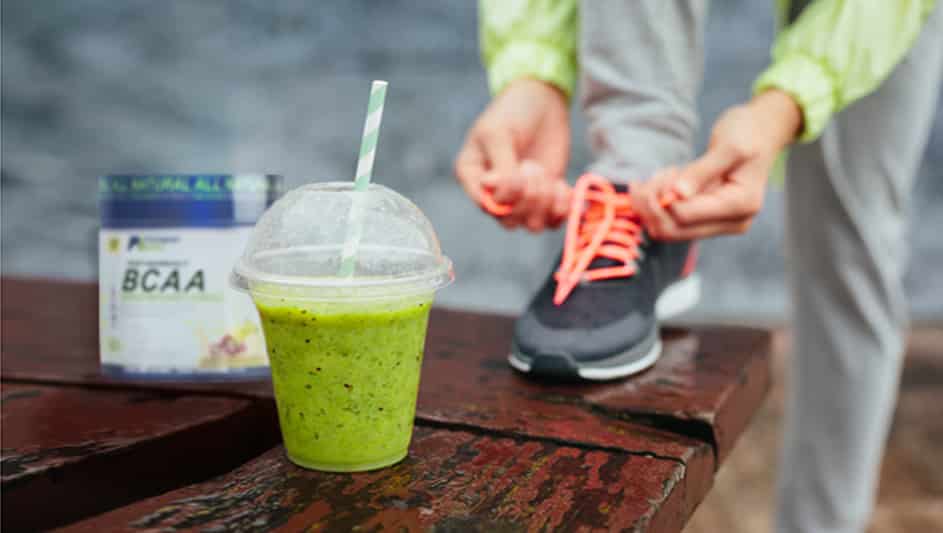Are BCAAs All They’re Cracked Up to Be?

When it comes to deciding which supplements are worth your time, money and tastebuds, the number of product choices and ingredients can be totally overwhelming. Pre-workout, post-workout, protein, BCAAs and loads of other options.
Your best bet in working out a routine that’s right for you is to understand what you’re putting in your body and why, starting with BCAAs. What are they? How do they work? And do you really need them to get the most out of your workouts?
Educate yourself about BCAAs to see if a BCAA post-workout supplement is right for you to help you meet your goals. Spoiler: they are right for you if you want a faster recovery from your workouts so you can get back in the gym and crush it even harder next time.
What Are BCAAs?
BCAAs are branched-chain amino acids. What, you’ve never heard of them? Well, your body relies on them to keep itself going and fuel growth when you deplete stored glycogen, your body’s carbohydrate energy reservoir. The big problem is that your body can’t produce BCAA fuel on its own. You need to find a way to supply yourself with leucine, isoleucine and valine if you want to see and feel their benefits.

You can get some branched-chain amino acids from food sources. Foods containing soy products can provide all of the essential amino acids your body can’t make on its own, according to Dr. Aaron Michelfelder of Loyola University Chicago Stritch School of Medicine. Soy protein isolate packs 1.9 grams of leucine and 1.5 grams of isoleucine for every 1 ounce serving. Tofu can deliver 573 milligrams of valine in a half-cup serving.
BCAAs can be found in meat and fish, too. Just not in such concentrated quantities. One ounce of beefsteak boasts nearly 0.7 grams of leucine and 0.4 grams of isoleucine. Pork packs a little less, as does tuna, roasted chicken and roasted turkey. Poultry contains the highest amount of valine per serving, coming in at around 2,500 to 5,000 milligrams per pound.
Dairy products can provide BCAAs, too, with cheddar cheese clocking in around beefsteak levels at 0.7 grams of leucine and 0.4 grams of isoleucine. Dry cottage cheese contains 2,500 milligrams of valine in one cup. Regular cottage cheese and eggs offer around 0.4 grams of leucine and 0.2 grams of isoleucine and milk and yogurt have a little less.
The point is, your body needs BCAAs, especially if you’re planning to build muscle. Your diet provides some, if you’re eating healthily and keeping an eye on your intake, but it might not be enough to allow you to meet your fitness and physique goals.
What Do BCAAs Do?
We know they’re important for building muscle, but how do branched-chain amino acids work, exactly? Well, when you’re cutting calories and working out, you’re tearing your body down, putting it into a state of catabolic crisis. Your muscle is breaking down and the more lean it is, the more likely it is to lose mass, since your body is preferentially preserving whatever fat stores it can find.
Branched-chain amino acids can prevent this. When your muscles are breaking down on a molecular level, the proteins in them are busted up to release component amino acids for your body to use as fuel.BCAAs, which are amino acids joined together by carbon atoms, can stimulate protein synthesis, stopping the catabolic process in its tracks.

Leucine in particular is extraordinary at kicking protein synthesis into gear. It activates insulin, which increases the uptake of all amino acids into your cells. Leucine signals your muscles that amino acids are available, which, in conjunction with the activated insulin, stimulates protein synthesis, building those muscles up. This makes BCAAs both anti-catabolic and anabolic – a goal crushing combo. A study in the Journal of Nutrition claims that high doses of leucine can prevent protein degradation in skeletal muscle and in the liver.
Do You Really Need A BCAA Supplement?
So, if you can get branched-chain amino acids from food, why do you need to take a BCAA supplement? Well, if you like eating loads of protein, you might be able to get away without a BCAA boost post-workout. But for the majority of folks who would rather guzzle a quick drink right after a gym session than stomach a whole steak, BCAA supplements are a great solution.
BCAA supplements require no digestion, so they bypass your liver and go right into your bloodstream, which means they’re more fast-acting than branched-chain amino acids you get from food. Supplements can help with muscle fatigue by maintaining cellular energy levels. A paper from the Huntington College of Health Sciences claims that BCAA supplements can provide between a 3 and 18 percent increase in energy, depending on the length and intensity of your workout.
It’s also fantastic for the recovery of your muscles. The same paper explains that protein degradation after a workout can be reduced with a post-workout BCAA supplement, especially one containing leucine. Studies included in the paper indicated that 5.6 grams of BCAA supplements twice a day can improve weight lifting recovery and muscle stability, which is exactly what you need if you’re looking to hit the gym hard and crush your goals. For a rugby player it took 3.6 grams twice a day to improve recovery time, so if you’re more athlete than body builder, BCAAs can aid in your rebound time, too.

When Should You Take BCAAs?
When you take branched-chain amino acid supplements is largely dependent on what you want to get out of them. If your goal is to prevent fatigue during your workout, find a pre-workout supplement that contains BCAAs. For a faster recovery, take them as part of your post-workout.
They’re best taken without any other amino acids, however, since they’re so fast and powerful they can knock lesser amino acids out of the game. And remember that they’re going to spike your insulin, so be careful if you have any sensitivity. Take them with a meal, if you can, to even out your blood sugar. Adding BCAA supplements to your routine can help you achieve your goals faster and kick even more butt in the gym.


